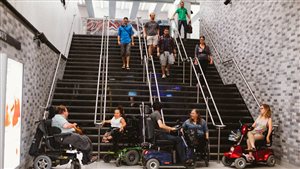
You have to wonder when the nonsense will end. I refer to the treatment of people with disabilities in Canada.
A couple of quick facts: In 2012, about 3.8 million Canadians–13.7 per cent of the population–reported having a disability.
Now, ask yourself this: How come a society that preaches equal rights does so little for such a big part of its population?
Let’s take public transportation in Montreal as an example.
- People in wheelchairs in the city of Montreal and its northern exurb of Laval have access to just nine of the cities’ 68 metro stations.
- One station on the five major suburban rail lines is accessible to wheelchair users.
- When a spanking new super-hospital opened this year, wheelchair access from the metro to the hospital was not included.
- A third of the pneumatic lifts that raise and lower Montreal buses are working at any given time
To be fair, two metro stations have added elevators in the past seven months, and two more are scheduled to be installed by 2017. Montreal’s transportation authority now has set a goal of 17 accessible stations by 2020.
Activists note that the rate will the Montreal Metro system fully accessible by 2090.
If any other segment of our society faced this kind of prejudice, there would be outrage. At least one hopes there would be outrage.

But what we mostly get is indifference, apathy and rationalization. Until, of course, someone in your family needs a wheelchair.
Still, we’re also starting to get something else; blow-back from people with disabilities and their growing number of supporters.
More and more, people with disabilities are making their presence felt, getting their voices heard, not shutting themselves away. They are organizing and lobbying.
One of those persons is Isabelle Ducharme, a force of nature and goodness who lost the use of her arms and legs in an automobile accident in 1988 when she was serving as an aircraft mechanic with the Canadian Forces in Manitoba.
Ducharme, who has won numerous awards for her activism, is currently president of Kéroul, a non-profit organization which, through information and lobbying, promotes and develops accessible tourism and culture.
She spoke to RCI by phone from her home in Montreal.
Listen






For reasons beyond our control, and for an undetermined period of time, our comment section is now closed. However, our social networks remain open to your contributions.